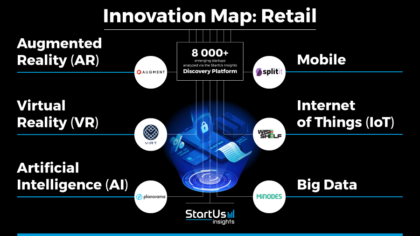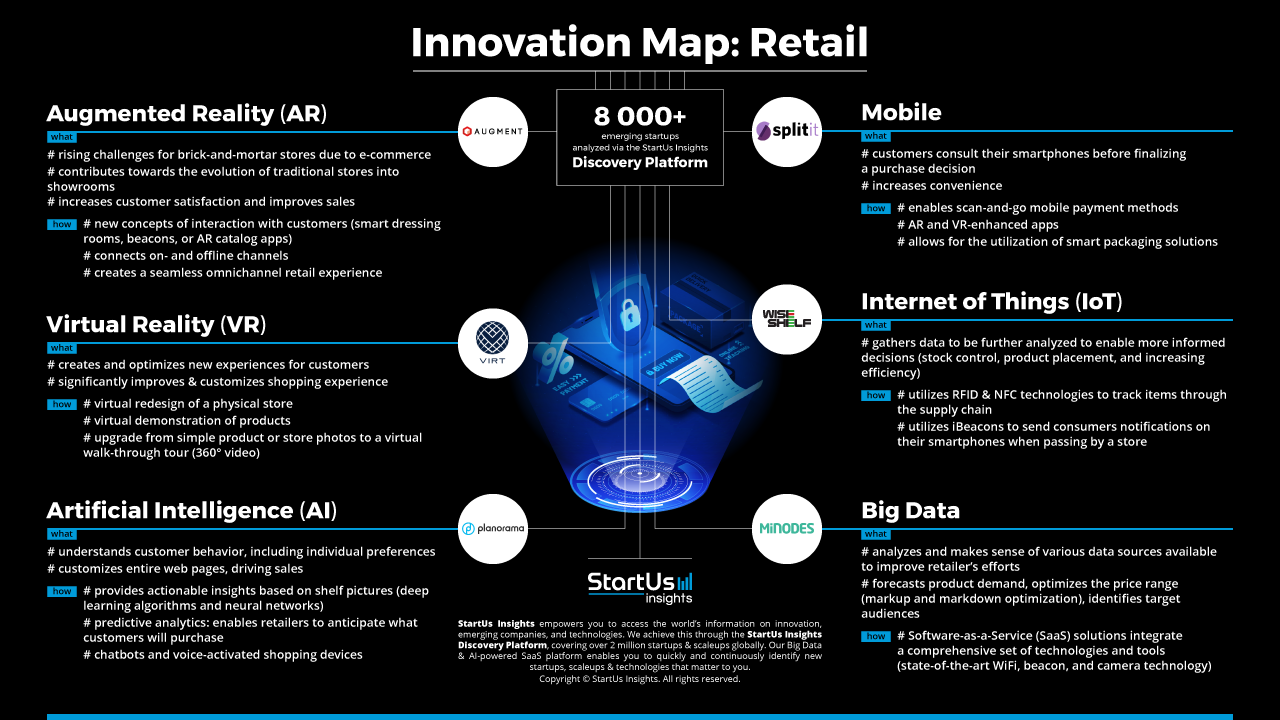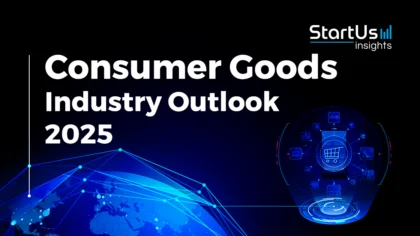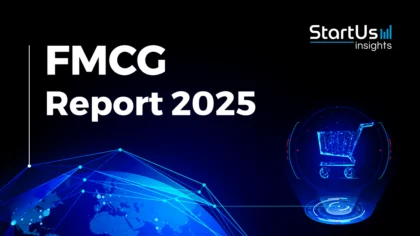Accelerate Productivity in 2025
Reignite Growth Despite the Global Slowdown
As consumer preferences and behavior have changed with the introduction of eCommerce businesses and on-demand delivery, retailers turn to emerging technologies to find alternative ways to keep their customers happy and serve them from all angles. Innovations such as artificial intelligence, augmented reality, and advanced data analytics are being leveraged to enhance the shopping experience, streamline operations, and provide personalized services.
By integrating these cutting-edge technologies, retailers can better understand consumer needs, offer tailored recommendations, and improve overall customer satisfaction. This shift not only helps in retaining customers but also in attracting new ones in a highly competitive market.
This article was last updated in July 2024.
Dive into Our Data-driven Retail Innovation Map
Our innovation & startup scouting analysts researched 8.000+ startups to identify the key technologies driving the digital transformation in the retail industry. This research is backed by our proprietary AI- and data-driven innovation scouting approach, allowing us to provide you with actionable intelligence on startup-driven innovation. Let’s take a look at what’s next for the retail industry:
Ready to explore all 8000+ Retail Startups & Scaleups?
Augmented Reality (AR)
Augmented reality is one of the more common technologies already used by retailers globally. As brick-and-mortar stores increasingly face challenges due to the rise of eCommerce, traditional stores are on a journey to transform into showrooms. In these, AR supports vendors to increase interaction with customers through smart dressing rooms, beacons, or AR catalog apps – resulting in increased customer satisfaction and higher sales.
Virtual Reality (VR)
Utilizing VR in physical stores massively increases opportunities for retailers. Specifically, retailers can draw from two core application cases. Firstly, the virtual redesign of a physical store allows for the optimization and even the creation of a new experience for customers – every single time they enter that store. Secondly, the virtual demonstration of products holds great potential as shown by the clothing and cosmetics industry. Moreover, virtual reality offers to create a very personalized shopping experience thus overall improving it.
Artificial Intelligence (AI)
Through understanding customer behavior (including individual preferences) and anticipating what customers will purchase next, forward-looking retailers make use of artificial intelligence to drive sales. AI has a history of high accuracy as famously demonstrated by Target which predicted the pregnancy and due date of a 23-year old back in 2012. Said to eventually replace shopping assistants, AI also powers chatbots and voice-assisted shopping devices.
Mobile
With 82% of customers already consulting their smartphones before finalizing their purchase decision, the trend toward mobile will continue its significant influence on the retail sector. Vendors not only optimize their websites accordingly but also start to add emerging technologies such as AR- and VR-enhanced apps, smart packaging, or upgraded mobile payment models to their business models to increase convenience for customers.
Looking for Specific Retail Innovation Trends?
Internet of Things (IoT)
In the retail industry, the Internet of Things allows for the gathering of data which is further analyzed to enable more informed decision-making in regards to stock control, product placement, and increasing efficiency. RFID, NFC tags as well as different sensors are used for tracking items through the supply chain and keeping an eye on in-store inventory in real-time. Another application for the IoT in the retail industry is the utilization of iBeacons to send consumers notifications on their smartphones when passing by a store in pursuit of increasing sales.
Big Data
We have already established that consumers provide retailers with various data sources. However, this data is only valuable once vendors can make sense of it. When done right, the possibilities of big data range from forecasting product demand, and optimizing the price range (markup and markdown optimization) to identifying target audiences.
Meet Some of the Disruptive Retail Startups
- Paris-based Augment connects on- and offline channels through an augmented reality platform, therefore creating a seamless omnichannel retail experience.
- Virt brings “reality into virtual reality”. The startup’s technology allows retailers to upgrade from simple product or store photos to a virtual walk-through tour by using a 360-degree video rover which maps a location before deploying it cross-platform.
- French startup Planorama makes use of deep learning algorithms and neural networks to equip vendors with actionable insights based on shelf pictures. Through leveraging AI, their solution analyzes and recognizes millions of product items.
- Splitit offers an Installments-as-a-Service platform, enabling merchants to provide installment payment options without extra debt, interest, or hidden fees for consumers, who can still enjoy their existing credit card rewards. Their white-label solution integrates seamlessly with merchants’ existing payment systems through a single global API. By leveraging global credit card networks and offering an issuer-agnostic approach, Splitit ensures broad participation in the installment payment ecosystem, addressing the limitations of traditional BNPL services.
Explore Emerging Retail Startups & Technologies
To conclude, the retail industry is in the middle of an evolution that challenges traditional brick-and-mortar stores as well as online sellers. Ultimately, developing technologies along with new customer expectations will deeply impact the retail industry, making tomorrow’s shopping a personalized, faster, and more convenient experience.
Technologies such as 3D Printing & Imaging, in-store customization, biometrics, gamification, and face recognition shape the way consumers shop, calling for vendors to deploy these technologies in order to profit from this transition.





![AI in Retail: A Strategic Guide for Industry Leaders [2025-2030]](https://www.startus-insights.com/wp-content/uploads/2025/04/AI-in-Retail-SharedImg-StartUs-Insights-noresize-420x236.webp)



